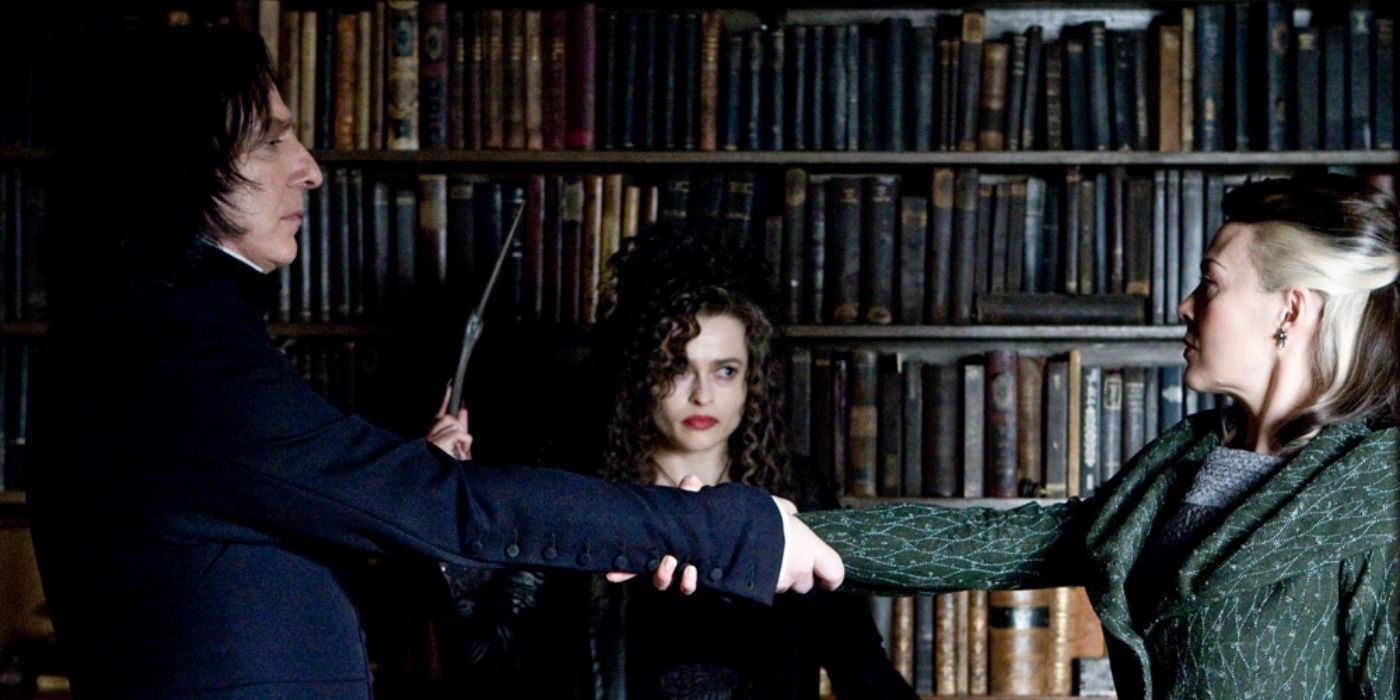Harry Potter and the Half-Blood Prince‘s Unbreakable Vow plotline brought more questions than answers, and 19 years later, this now falls on the Harry Potter TV remake. Severus Snape made the Unbreakable Vow to Narcissa Malfoy at Bellatrix Lestrange’s suggestion. It was meant to ensure that he wouldn’t do anything against Draco’s best interest and that he would murder Albus Dumbledore if the boy should fail. It was the first time such a magical vow was mentioned in the Harry Potter series, which is strange since it certainly would have come in handy prior.
As the name suggests, Unbreakable Vows can’t be broken in Harry Potter—or, at least, not without intense consequences. The person who fails to hold up their end of the deal is doomed to die, which is why an Unbreakable Vow was the perfect solution to Bellatrix. She suspected that Snape wasn’t truly loyal to Voldemort and would, therefore, pretend to protect Narcissa’s son, only to turn on him in the end. What Bellatrix didn’t know is that Snape had already promised Dumbledore that he would kill him instead of Draco, so the Vow’s risk was lessened. Still, there are some problems here.
Harry Potter’s Remake Must Address Why Wizards Don’t Use Unbreakable Vows More Often
Unbreakable Vows Were Only Added To The Mix In Book 5
Snape’s Unbreakable Vow was the only time this unique curse was used in the Harry Potter series, and this seems rather strange. The magic of the Wizarding world makes deception far easier than in the Muggle world. Therefore, it seems that characters would take every opportunity to ensure that a person’s word wouldn’t be broken. Of course, death is a rather extreme consequence, and the Unbreakable Vow would most certainly be considered Dark Magic. So, it makes some sense that Dumbledore or the Order of the Phoenix wouldn’t utilize such a power—but why not Voldemort?
The Unbreakable Vow Could Have Been Useful Before Harry Potter & The Half-Blood Prince
Lord Voldemort Doomed Himself By Not Using The Unbreakable Vow
Voldemort’s downfall came about, in part, because people he thought were loyal to him betrayed him. Snape was a double agent from the moment the Dark Lord set his sights on Lily Potter, but Voldemort foolishly continued to trust him. Snape even mentioned during his conversation with Bellatrix and Narcissa that Voldemort had questioned his loyalty after Harry Potter and the Goblet of Fire. He managed to convince the Dark Lord he was still on his side by claiming that he had remained at Hogwarts out of faith that Voldemort would return and need his intel. That was, weirdly, enough for the Dark Lord.
It’s strange that Bellatrix was the first to consider making Snape use the Unbreakable Vow. Surely, Voldemort would have utilized such Dark magic the moment Snape appeared before him only after his resurrection at the graveyard (rather than answering the Dark Lord’s initial summons). The villain would also have been wise to make all his Death Eaters swear the Unbreakable Vow the moment they entered his service to ensure they never made any attempt to betray him. For some reason or another, Voldemort never bothered, and it cost him dearly in Harry Potter.
Fixing This Harry Potter Plot Hole Creates Other Problems For HBO’s TV Show
HBO Will Have To Handle This Carefully
HBO’s Harry Potter TV remake has a chance to fix the Unbreakable Vow plot hole—but it won’t be easy. If the new series sees Voldemort force his Death Eaters to make the Unbreakable Vow to join his inner circle, then Snape’s entire story would become redundant. Perhaps the easiest solution would be to reveal that breaking an Unbreakable Vow doesn’t lead to immediate death. It could work more like the life debts in Harry Potter, which will eventually result in a person’s death as destiny sees fit. Still, this would somewhat lessen the impact of Snape’s vow in Half-Blood Prince.
The HBO series has boasted itself as “book faithful,” which means even attempts to improve the continuity could be an issue.
Just about any way that the Harry Potter TV show could address the Unbreakable Vow problem would require some changes to the canon story, and this isn’t typically received well by long-time fans. The HBO series has boasted itself as “book faithful,” which means even attempts to improve the continuity could be an issue. The Harry Potter remake would have to find a solution that fits seamlessly with the established canon but fills up the 19-year-old holes left by the books. Whether it can successfully manage this remains to be seen.

